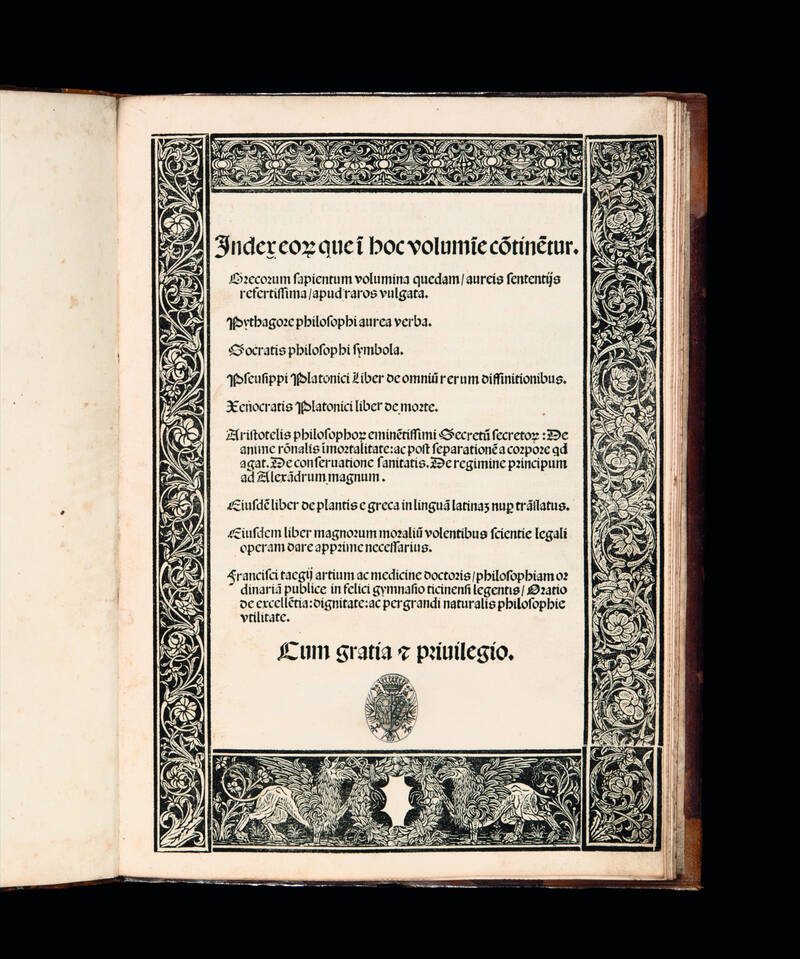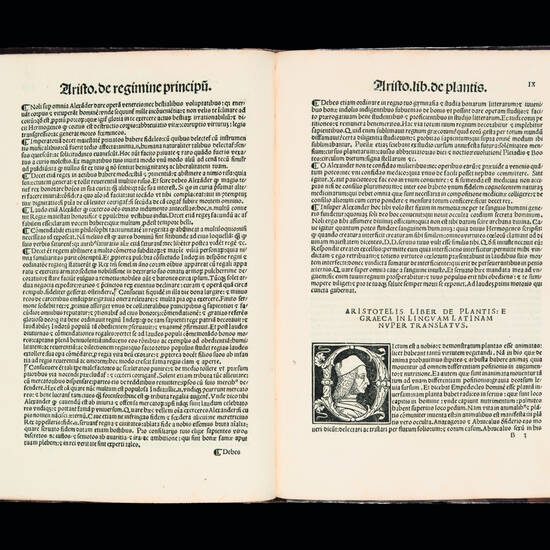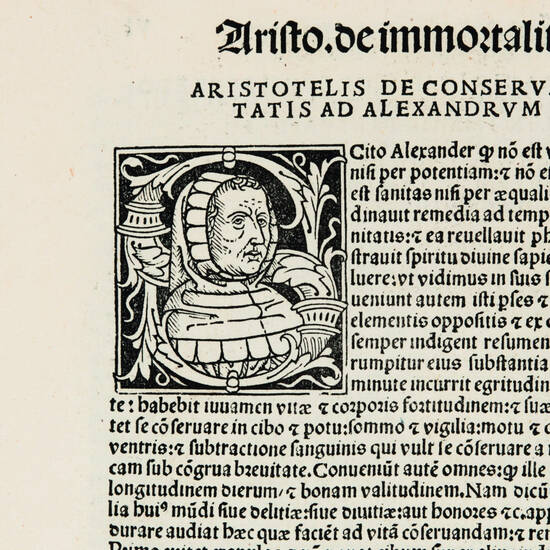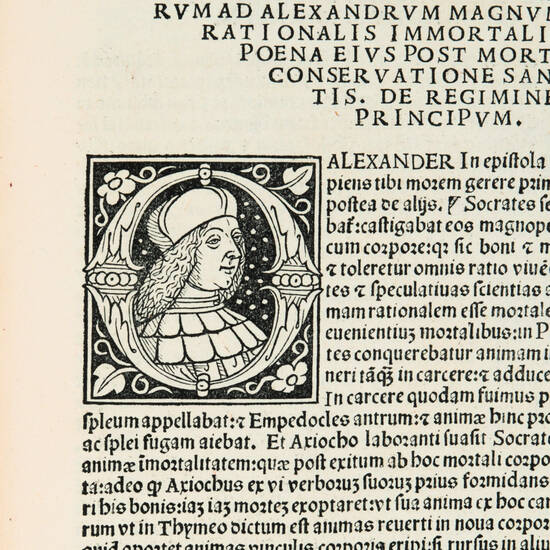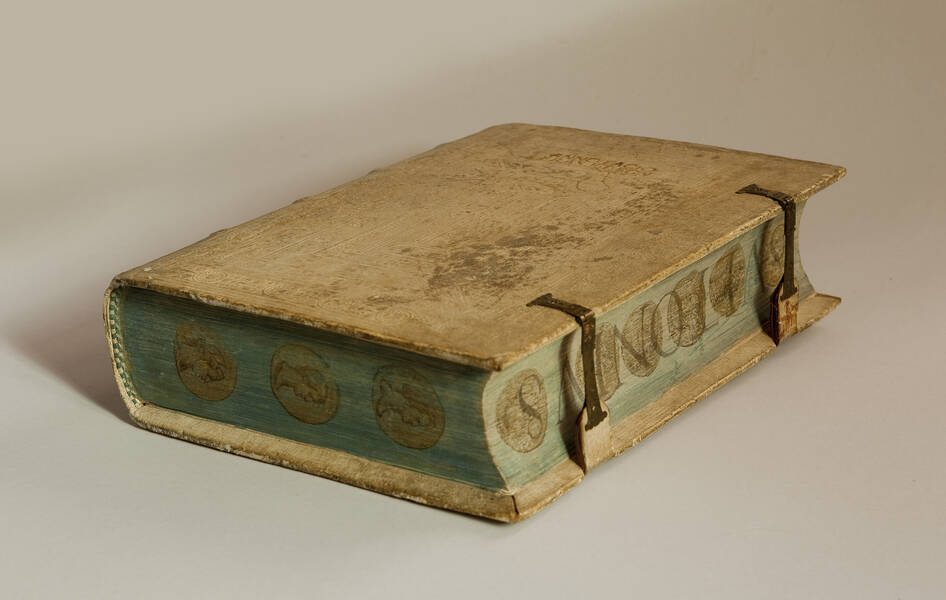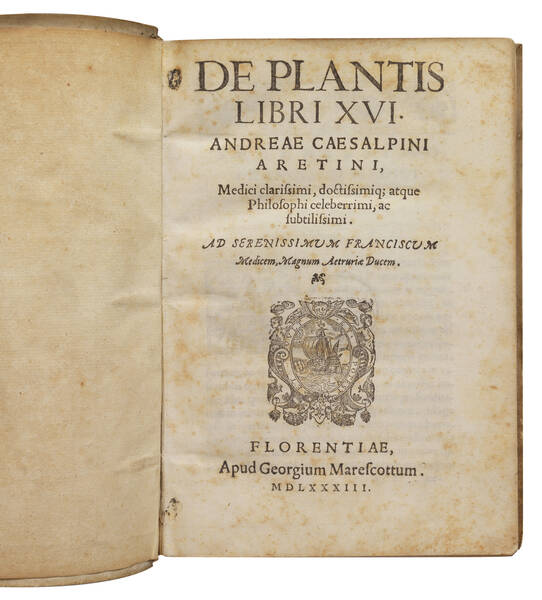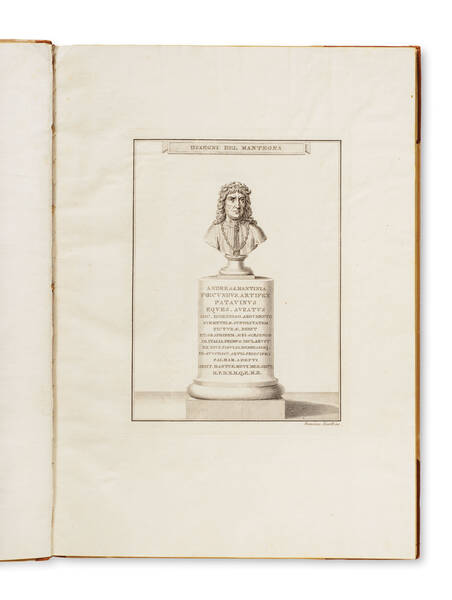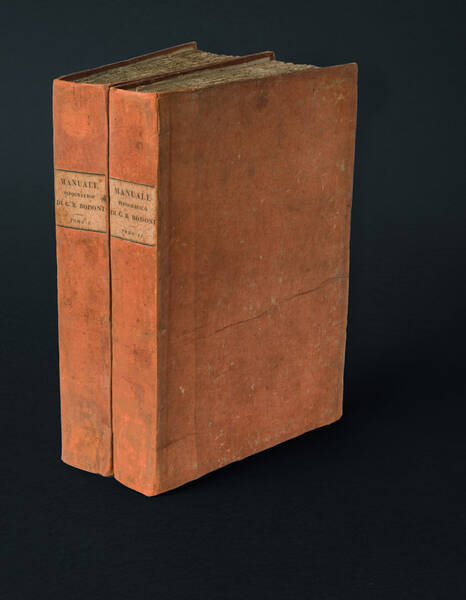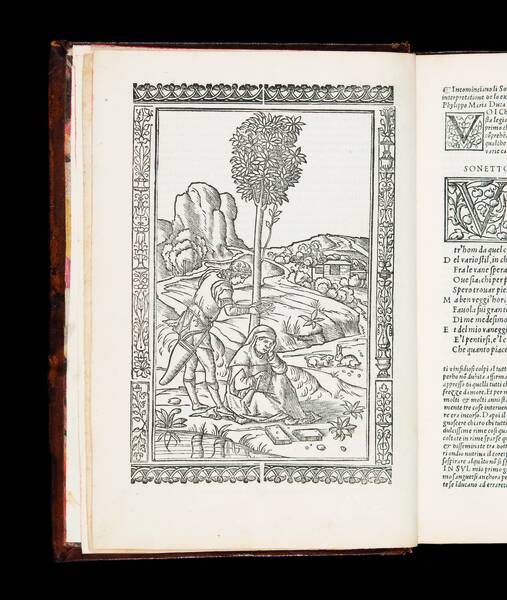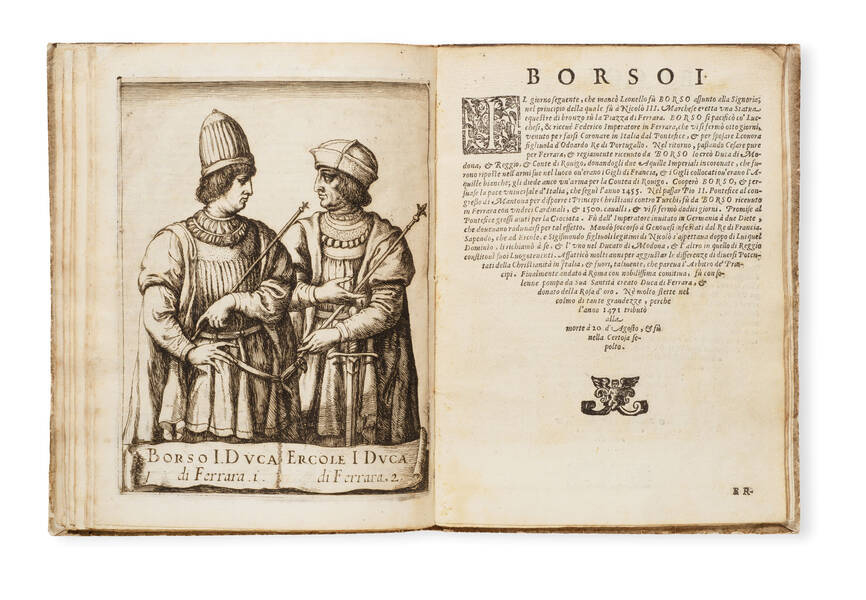TAEGIO, Francesco. Grecorum sapientum volumina quedam aureis sententijs refertissima apud raros vulgata. Pythagore Aurea verba. Socratis Symbola. Pseusippi Platonici Liber de omnium rerum diffinitionibus. Xenocratis Platonici Liber de morte. Aristotelis Secretum secretorum ... Francisci Taegi Oratio de excellentia dignitate ac pergrandi naturalis philosophie vtilitate.
Pavia, Iacob Pulchridrapensis de Burgofrancho imprimi curabat., 1516 IIII idus Martij.Folio (270 x 178 mm.), XXX leaves, Gothic types, very fine four-part woodcut white-on-black title border, sides with leafy and floral Renaissance ornaments, at bottom two griffins holding a shield; seven 12-line portraits initials depicting famous men, four 12-line elaborate Renaissance ornamental initials, numerous smaller initials, woodcut printer's device at the end. Small oval heraldic paper ex libris pasted on title page, a very fine copy bound in XVIII century brown calf, covers with blind and gilt geometric decoration, rebaked.
Very rare miscellaneous edition of ten philosophical texts, nine of which are spurious works of Greek philosophy, while the last one is a speech delivered by Francesco Taegio in defence of natural philosophy. The first two writings (Aurea verba and Symbola), curiously attributed to Socrates acually are Pythagorean, followed by two Platonic works (De omnium rerum diffinitionibus and De morte) and five Aristotelian ones (three from the Secretum secretorum, De plantis, and Magna moralia).
Francesco Taegio was a physician, philosopher, and knight, from Novara. In 1520 he became professor of philosophy at the University of Pavia. In his posthumous autobiography, the mathematician Gerolamo Cardano (1501– 1576), recalled attending some of Taegio's lectures.
In the preface to the volume, Taegio claims the provenance of these works from a manuscript in the library of Giovanni Pico della Mirandola.
The Aurea verba consist of a series of rules of life that members of the Pythagorean sect were required to observe: “much of the advice is common to all of Greek ethical thought (e.g., honoring the gods and parents; mastering lust and anger; deliberating be fore acting, following measure in all things), but there are also mentions of dietary restrictions typical of early Pythagoreanism and the promise of leaving the body behind to join the aither as an immortal.” (C. Huffman, "Pythagoreanism", The Stanford Encyclopedia of Philosophy). Similarly, the Symbola, traditionally attributed to Pythagoras, consist of a list of rules particularly concerning personal virtue, with frequent exhortations to practise moderation in all areas of life.
The Secretum secretorum, originally the Arabic Sirr al-Asrar translated into Latin from the 12th century onwards, circulated in Europe as a letter addressed by Aristotle to Alexander the Great. Three texts are drawn from it here: De animae rationalis immortalitate, De conservatione sanitatis, and De regimine principum. A Neapolitan edition of the Secretum (1555) by Francesco Storella(1529– 1575) directly references the text presented by Taegio, specifying that “Ticinii liber, qui secretum secretorum Aris totelis inscribitur, fuit excussus a praesenti tamen longe diversus, liber siquidem ille in treis partes est scissus, in quibus, tribus Alexandri postulationibus fit satis, in prima agitur de immortalitate animae, in secunda de conservatione sanitatis, in tertia vero de regimine principum.”
The De plantis is also pseudo-Aristotelian: “most modern opinion follows Meyer in attributing the work to Nicolaus of Damascus (fl. 37-4 B.C.)” (S.D. Wingate, The Medieval Latin Versions of the Aristotelic Scientific Corpus, London 1931). The text in this volume, which Taegio claims is a recent translation from Greek, “is of considerable interest, but whose author and date are as yet unknown. […] [It] is in reality a commentary in which fragments of the Latin version of Alfredus [de Sareshel] are embedded. After two pages, the commentary ceases in the first book of De plantis, and the rest of the work is a commentary on the last section of the De coloribus (a section which itself is not infrequently entitled “De plantis” in the manuscripts)” (Ivi).
Closing the volume is a discourse by Taegio on “the excellence, dignity and great usefulness of natural philosophy”: tracing the first centuries of the history of Greek philosophy, Taegio's intention is to indicate the value of Aristotelian thought to the extent that it was able to give a cosmological and ontological foundation to its natural doctrine. It is precisely the knowledge of sensible things that allows a higher form of intellect, one capable of accessing the divine world: “ex motu aeterno ad Dei optimi max imique ac intelligentiarum caelestium firmam et semper eandem stabilitatem”.
USTC lists only four copies outside Italy (BL; Oxford Bodleian; Paris Mazarine and Valencia) and none in the United States.
Argelati, I, pp. 1475-6; PROCTOR 13902; G. Tinazzo, Il tipografo-editore Iacopo Pocatela (Pavia 1490-Venezia 1538), in Atti e memorie dell'Accademia Patavina di scienze, lettere ed arti 70 (1957-1958); UNPAV p. 169.
Other Books
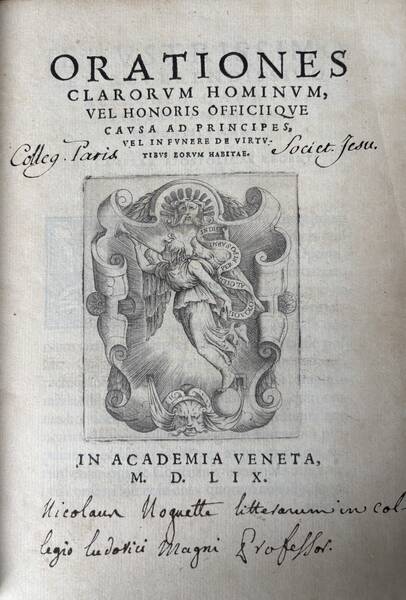
ACCADEMIA VENETA
Orationes clarorum hominum, vel honoris officiique causa ad principes, vel in funere de virtutibus eorum habitae.
€ 1.500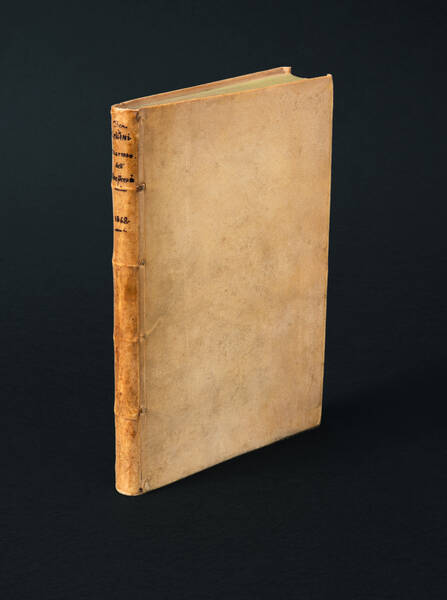
CELLINI, Benvenuto
Due trattati vno intorno alle otto principali arti dell'oreficeria. L'altro in materia dell'arte della scultura; doue si veggono infiniti segreti nel...
€ 12.000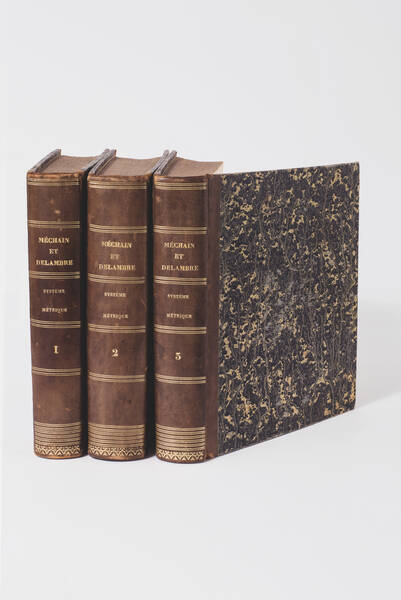
DELAMBRE, Jean-Baptiste-Joseph & MÉCHAIN, Pierre-François-André
Base du système métrique décimal, ou mesure de l'arc du méridien compris entre les parallèles de Dunkerque et Barcelone, exécutée en 1792 et années...
SOLD OUT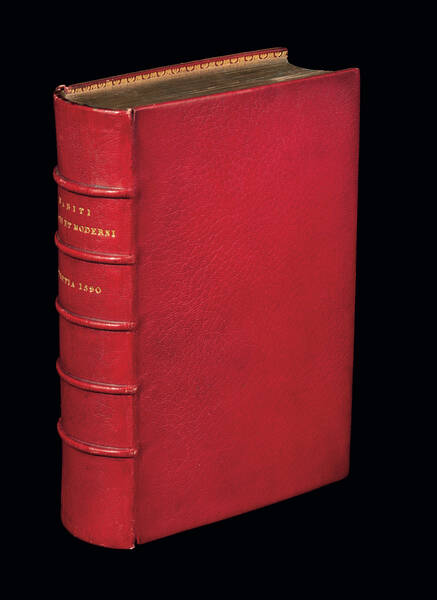
VECELLIO, Cesare
Degli Habiti Antichi, et Moderni di Diverse Parti del Mondo Libri due, fatti da Cesare Vecellio, & con Discorsi da Lui Dichiarati.
SOLD OUT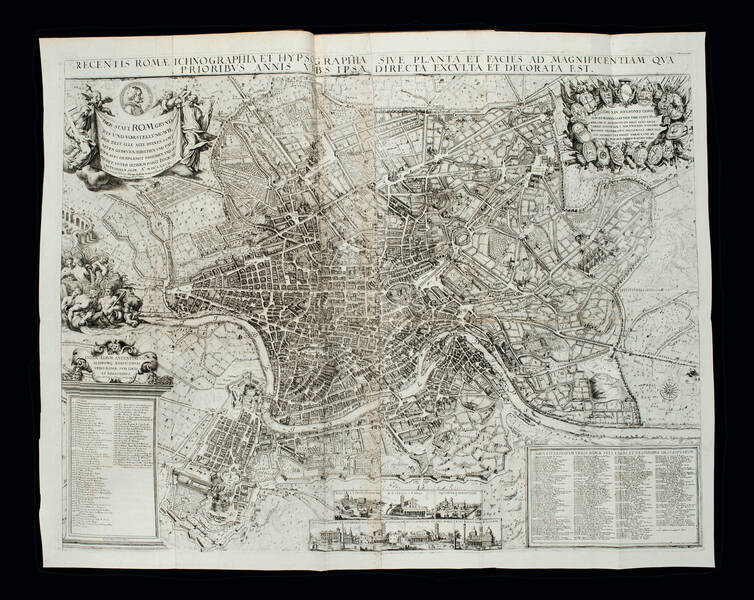
SANDRART, Joachim von
Romae antiquæ et novæ theatrum; sive, genuina ac vera urbis, juxta varios ejusdem status, delineatio topographica.
SOLD OUT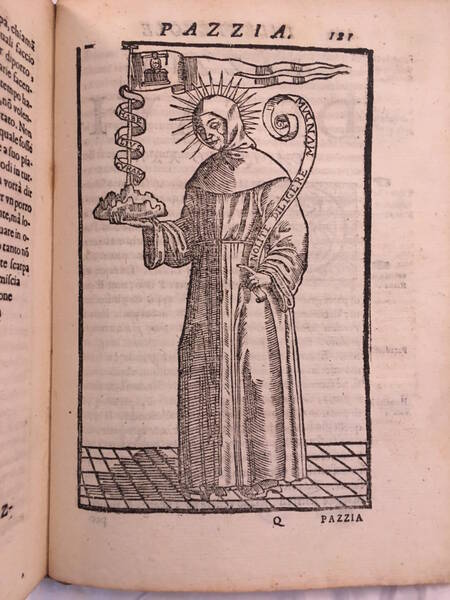
SPELTA, Antonio Maria
La saggia pazzia, fonte d’allegrezza, madre de’ piaceri, regina de’ belli humori.
€ 2.000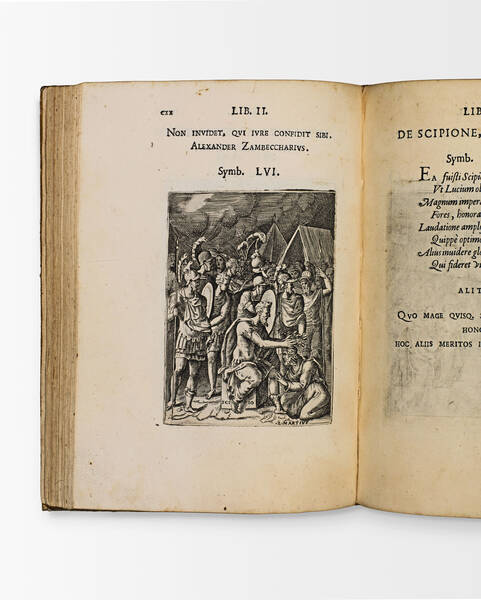
BOCCHI, Achille
Symbolicarum quaestionum, de universo genere quas serio ludebat, libri quinque.
SOLD OUT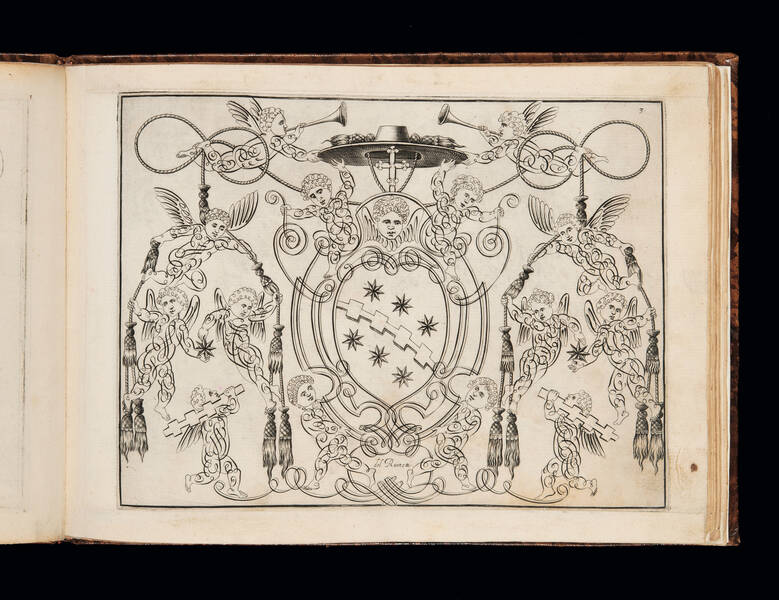
RUINETTI, Tomaso
Idea del buon scrittore, opera prima di Tomaso Ruinetti da Ravena a’beneficio de’desiderosi d’imitare le vere forme dello scrivere.
€ 8.000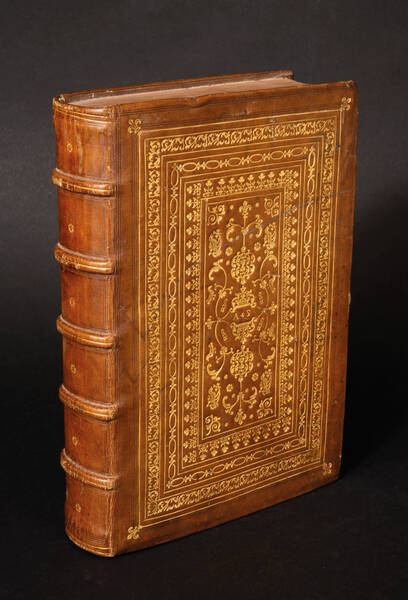
LIVIUS, Titus
Le deche di T. Liuio padouano delle historie romane, tradotte nella lingua toscana, da Iacopo Nardi cittadino fiorentino, & nuouamente dal medesimo...
€ 30.000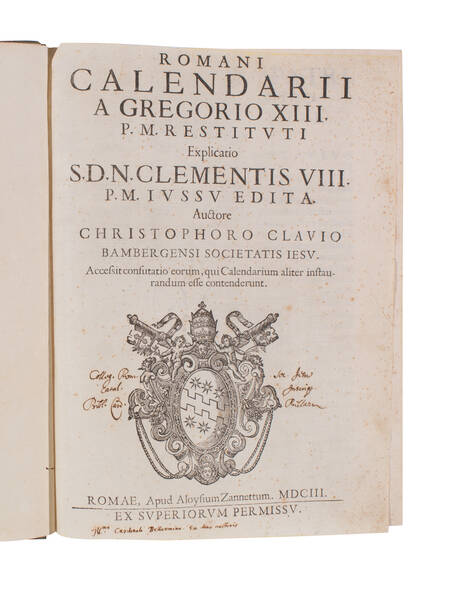
CLAVIUS, Christoph
Romani calendarii a Gregorio XIII. P.M. restituti Explicatio S.D.N. Clementis VIII. P.M. iussu edita.
SOLD OUT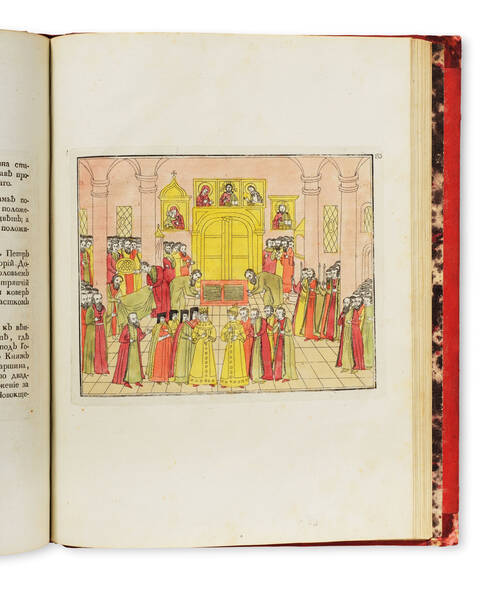
BEKETOV, Platon
Opisanie v litsakh torzhestva, proiskhodivshego v 1626 godu fevralia 5, pri brakosochetanii gosudaria tsaria i velikogo kniazia Mikhaila...
€ 18.000MEDA RIQUIER rare books ltd.
4 Bury Street St James's
SW1Y 6AB London
Phone +44 (0) 7770457377
info@medariquier.com
